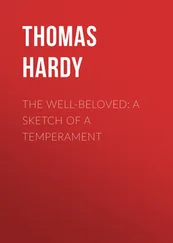Her nerves extended into those tresses, and her temper could always be softened by stroking them down. When her hair was brushed she would instantly sink into stillness and look like the Sphinx. If, in passing under one of the Egdon banks, any of its thick skeins were caught, as they sometimes were, by a prickly tuft of the large Ulex Europoeus—which will act as a sort of hairbrush—she would go back a few steps, and pass against it a second time.
She had pagan eyes, full of nocturnal mysteries, and their light, as it came and went, and came again, was partially hampered by their oppressive lids and lashes; and of these the under lid was much fuller than it usually is with English women. This enabled her to indulge in reverie without seeming to do so—she might have been believed capable of sleeping without closing them up. Assuming that the souls of men and women were visible essences, you could fancy the colour of Eustacia’s soul to be flamelike. The sparks from it that rose into her dark pupils gave the same impression.
The mouth seemed formed less to speak than to quiver, less to quiver than to kiss. Some might have added, less to kiss than to curl. Viewed sideways, the closing-line of her lips formed, with almost geometric precision, the curve so well known in the arts of design as the cima-recta, or ogee. The sight of such a flexible bend as that on grim Egdon was quite an apparition. It was felt at once that the mouth did not come over from Sleswig with a band of Saxon pirates whose lips met like the two halves of a muffin. One had fancied that such lip-curves were mostly lurking underground in the South as fragments of forgotten marbles. So fine were the lines of her lips that, though full, each corner of her mouth was as clearly cut as the point of a spear. This keenness of corner was only blunted when she was given over to sudden fits of gloom, one of the phases of the night-side of sentiment which she knew too well for her years.
Her presence brought memories of such things as Bourbon roses, rubies, and tropical midnight; her moods recalled lotus-eaters and the march in Athalie; her motions, the ebb and flow of the sea; her voice, the viola. In a dim light, and with a slight rearrangement of her hair, her general figure might have stood for that of either of the higher female deities. The new moon behind her head, an old helmet upon it, a diadem of accidental dewdrops round her brow, would have been adjuncts sufficient to strike the note of Artemis, Athena, or Hera respectively, with as close an approximation to the antique as that which passes muster on many respected canvases.
But celestial imperiousness, love, wrath, and fervour had proved to be somewhat thrown away on netherward Egdon. Her power was limited, and the consciousness of this limitation had biassed her development. Egdon was her Hades, and since coming there she had imbibed much of what was dark in its tone, though inwardly and eternally unreconciled thereto. Her appearance accorded well with this smouldering rebelliousness, and the shady splendour of her beauty was the real surface of the sad and stifled warmth within her. A true Tartarean dignity sat upon her brow, and not factitiously or with marks of constraint, for it had grown in her with years.
Across the upper part of her head she wore a thin fillet of black velvet, restraining the luxuriance of her shady hair, in a way which added much to this class of majesty by irregularly clouding her forehead. “Nothing can embellish a beautiful face more than a narrow band drawn over the brow,” says Richter. Some of the neighbouring girls wore coloured ribbon for the same purpose, and sported metallic ornaments elsewhere; but if anyone suggested coloured ribbon and metallic ornaments to Eustacia Vye she laughed and went on.
Why did a woman of this sort live on Egdon Heath? Budmouth was her native place, a fashionable seaside resort at that date. She was the daughter of the bandmaster of a regiment which had been quartered there—a Corfiote by birth, and a fine musician—who met his future wife during her trip thither with her father the captain, a man of good family. The marriage was scarcely in accord with the old man’s wishes, for the bandmaster’s pockets were as light as his occupation. But the musician did his best; adopted his wife’s name, made England permanently his home, took great trouble with his child’s education, the expenses of which were defrayed by the grandfather, and throve as the chief local musician till her mother’s death, when he left off thriving, drank, and died also. The girl was left to the care of her grandfather, who, since three of his ribs became broken in a shipwreck, had lived in this airy perch on Egdon, a spot which had taken his fancy because the house was to be had for next to nothing, and because a remote blue tinge on the horizon between the hills, visible from the cottage door, was traditionally believed to be the English Channel. She hated the change; she felt like one banished; but here she was forced to abide.
Thus it happened that in Eustacia’s brain were juxtaposed the strangest assortment of ideas, from old time and from new. There was no middle distance in her perspective—romantic recollections of sunny afternoons on an esplanade, with military bands, officers, and gallants around, stood like gilded letters upon the dark tablet of surrounding Egdon. Every bizarre effect that could result from the random intertwining of watering-place glitter with the grand solemnity of a heath, was to be found in her. Seeing nothing of human life now, she imagined all the more of what she had seen.
Where did her dignity come from? By a latent vein from Alcinous’ line, her father hailing from Phaeacia’s isle?—or from Fitzalan and De Vere, her maternal grandfather having had a cousin in the peerage? Perhaps it was the gift of Heaven—a happy convergence of natural laws. Among other things opportunity had of late years been denied her of learning to be undignified, for she lived lonely. Isolation on a heath renders vulgarity well-nigh impossible. It would have been as easy for the heath-ponies, bats, and snakes to be vulgar as for her. A narrow life in Budmouth might have completely demeaned her.
The only way to look queenly without realms or hearts to queen it over is to look as if you had lost them; and Eustacia did that to a triumph. In the captain’s cottage she could suggest mansions she had never seen. Perhaps that was because she frequented a vaster mansion than any of them, the open hills. Like the summer condition of the place around her, she was an embodiment of the phrase “a populous solitude”—apparently so listless, void, and quiet, she was really busy and full.
To be loved to madness—such was her great desire. Love was to her the one cordial which could drive away the eating loneliness of her days. And she seemed to long for the abstraction called passionate love more than for any particular lover.
She could show a most reproachful look at times, but it was directed less against human beings than against certain creatures of her mind, the chief of these being Destiny, through whose interference she dimly fancied it arose that love alighted only on gliding youth—that any love she might win would sink simultaneously with the sand in the glass. She thought of it with an ever-growing consciousness of cruelty, which tended to breed actions of reckless unconventionality, framed to snatch a year’s, a week’s, even an hour’s passion from anywhere while it could be won. Through want of it she had sung without being merry, possessed without enjoying, outshone without triumphing. Her loneliness deepened her desire. On Egdon, coldest and meanest kisses were at famine prices, and where was a mouth matching hers to be found?
Fidelity in love for fidelity’s sake had less attraction for her than for most women; fidelity because of love’s grip had much. A blaze of love, and extinction, was better than a lantern glimmer of the same which should last long years. On this head she knew by prevision what most women learn only by experience—she had mentally walked round love, told the towers thereof, considered its palaces, and concluded that love was but a doleful joy. Yet she desired it, as one in a desert would be thankful for brackish water.
Читать дальше












